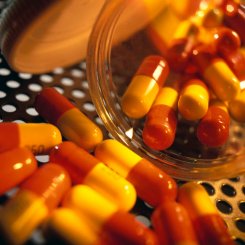27 August 2012
Tackling obesity by manipulating gut flora
by Will Parker
 Antibiotics could one day be the standard treatment for regulating weight, suggests a new study in Nature Immunology that examines the interactions between diet, the bacteria in our gut, and our immune systems.
Antibiotics could one day be the standard treatment for regulating weight, suggests a new study in Nature Immunology that examines the interactions between diet, the bacteria in our gut, and our immune systems.
The 500 different types of bacteria present in our gut provide the enzymes necessary for the uptake of nutrients, synthesize certain vitamins and boost absorption of energy from food. Last century, farmers learned that by tweaking the microbial mix in their livestock with low-dose oral antibiotics, they could accelerate weight gain.
In the new study, researchers at the University of Chicago found they were able to manipulate some of the mechanisms that regulate weight gain. They focused on the relationship between the immune system, gut bacteria, digestion and obesity. Their findings show how weight gain requires not just caloric overload but also a delicate, adjustable - and transmissible - interplay between intestinal microbes and the immune response.
"Diet-induced obesity depends not just on calories ingested but also on the host's microbiome," said the study's senior author Yang-Xin Fu, professor of pathology at the University of Chicago Medical Center. "For most people, host digestion is not completely efficient, but changes in the gut flora can raise or lower digestive efficiency."
In one experiment, the researchers compared normal mice with mice that have a genetic defect that renders them unable to produce lymphotoxin, a molecule that helps to regulate interactions between the immune system and bacteria in the bowel. On a standard diet, both groups of mice maintained a steady weight. But after nine weeks on a high-fat diet, the normal mice increased their weight by one-third, most of it fat. Mice lacking lymphotoxin ate just as much, but did not gain weight.
According to Fu, the high-fat diet triggered changes in gut microbes for both groups. The normal mice had a substantial increase in a class of bacteria (Erysopelotrichi) that has previously been associated with obesity.
The role of gut microbes was confirmed when the researchers transplanted bowel contents from the study mice to normal mice raised in a germ-free environment - and thus lacking their own microbiome. Mice who received commensal bacteria from donors that made lymphotoxin gained weight rapidly. Those that got the bacteria from mice lacking lymphotoxin gained much less weight for about three weeks, until their own intact immune system began to normalize their bacterial mix.
When housed together, the mice performed their own microbial transplants (mice are coprophagic, eating each other's droppings). In this way, the authors note, mice housed together "colonize one another with their own microbial communities." After weeks together, even mice with the immune defect began to gain weight.
Fu says moving from normal chow to the high-fat diet initiated a series of related changes. First, it altered the balance of microbes in the digestive system. These changes in the microbiome altered the immune response, which then introduced further changes to the intestinal microbial community. These changes "provide inertia for the obese state," the authors claim, facilitating more efficient use of scarce food resources.
"Our results suggest that it may be possible to learn how to regulate these microbes in ways that could help prevent diseases associated with obesity," said co-researcher Vaibhav Upadhyay. "We now think we could inhibit the negative side effects of obesity by regulating the microbiota and perhaps manipulating the immune response."
Or, 20 years from now, "when there are 10 billion people living on earth and competing for food, we may want to tilt digestive efficiency in the other direction," Fu added.
Related:
Discuss this article in our forum
Antibiotics found to have transgenerational effects
Novel psychiatric drugs aimed at gut bacteria
US diet engenders stupidity
Slow food, better mood
Source: University of Chicago Medical Center
